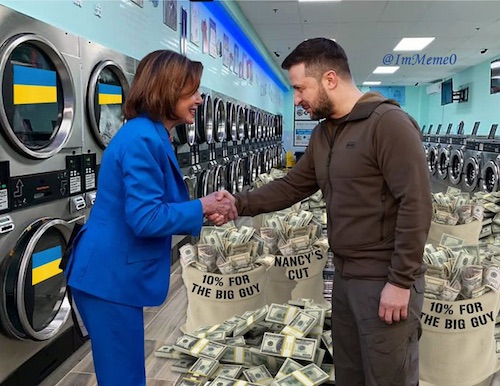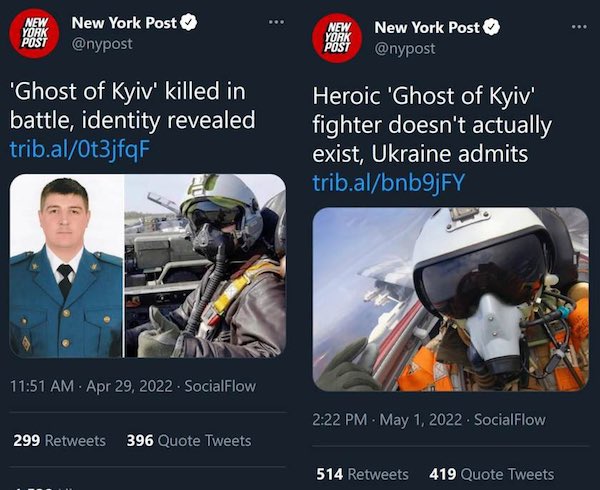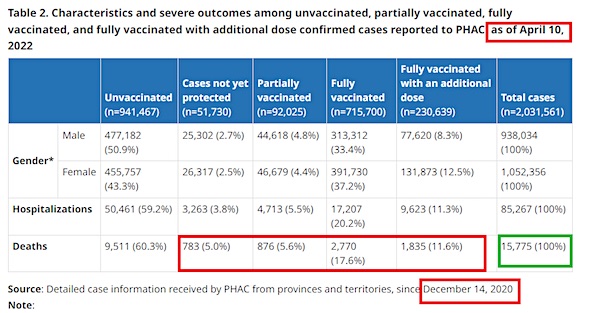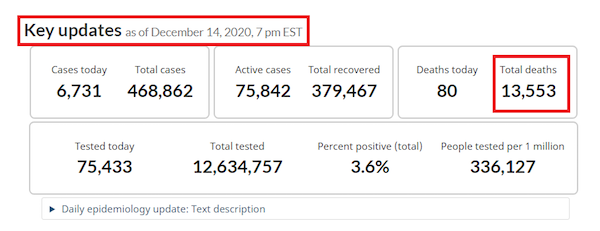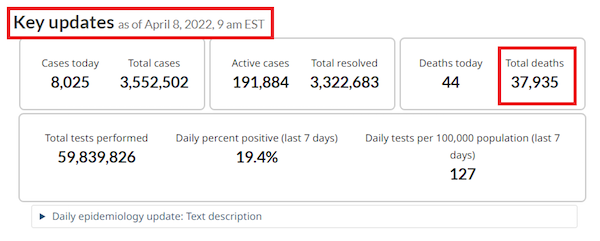
Vincent van Gogh Snowy landscape with Arles in the background 1888

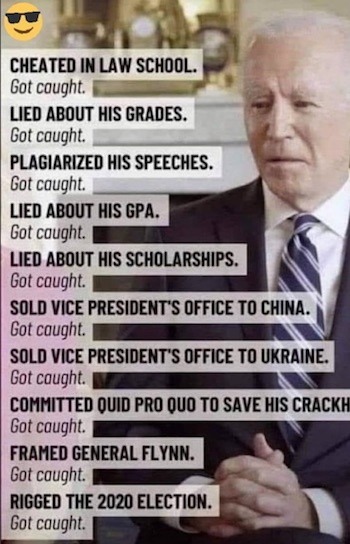

Liberal tears
https://twitter.com/i/status/1756706512540499971

Ads
https://twitter.com/i/status/1756692976426701093


Maria Zakharova: “After watching Putin’s interview, Scholz and Sunak disobeyed the orders of the USA.
“Scholz disobeyed the order of the USA not to watch the interview. If he continues to violate the instructions of the White House, he may lead Germany out of the crisis. The recent Prime Ministers of Britain, weak-willed individuals, they carried out the will not of the British people or even their own personal will, but obediently waltzed, led by Washington towards the boudoir.”

Nikki Haley
Now this is an ad.
— Sebastian Gorka DrG (@SebGorka) February 11, 2024
Trump Haley
https://twitter.com/i/status/1756832137980838180

Biden Superbowl
https://twitter.com/i/status/1756726329695973841

Sure this is not a Trump ad?!
Trump’s former Defense Secretary Mark Esper warns about the danger of a 2nd Trump term:
“He’ll completely cut off support for Ukraine, and that will begin the slow collapse of the alliance behind Ukraine…He would begin to withdraw troops from other countries…That will… pic.twitter.com/0vNwB6wU1r
— Republicans against Trump (@RpsAgainstTrump) February 11, 2024


“..the Kremlin had concerns even before the interview with Russian President Vladimir Putin that there would be a “persecution” of Tucker Carlson. ”
• How Ball Got Rolling With Tucker Carlson’s Putin Interview Proposal (Sp.)
Former Fox News host Tucker Carlson’s interview with Russian President Vladimir Putin, released Thursday, lasted more than two hours and covered a range of topics, including the Ukraine conflict, sabotage of the Nord Stream pipeline, and Russia-NATO relations. Kremlin spokesman Dmitry Peskov has told reporters that Tucker Carlson himself proposed the interview with Vladimir Putin and that the president quickly agreed. He also noted that the West is becoming more and more unpredictable, and that the Kremlin had concerns even before the interview with Russian President Vladimir Putin that there would be a “persecution” of Tucker Carlson.
Peskov believes that Tucker Carlson foresaw the heated sentiments around the interview with Vladimir Putin, but that it added to the popularity of the American journalist. “He’s still having a hard time, as far as I’m aware. But he is a clever enough man, I think he foresaw things would get heated. It’s fair to say that this interview has greatly raised his popularity,” Peskov said. On Thursday night, Carlson published his interview with the Russian president, which lasted for over two hours. Prior to that, the journalist faced criticism from his Western colleagues just for sitting down with the Russian leader. The interview sparked huge interest around the world, and has received more than 180 million views on X and 12 million on YouTube.
Oz dub
https://twitter.com/i/status/1756802067711115605

“..if past is prologue, watch for the Israeli government to disregard the protests of its partners and benefactors — protests that may be offered primarily for domestic consumption..”
• Egypt Warns Israel: Rafah Invasion Could Negate ’79 Peace Treaty (ZH)
With Israel on the verge of invading Gaza’s southernmost city, Egypt is warning that such a move could trigger a suspension of the treaty that has maintained peace between the two countries since 1979, the Wall Street Journal reports. Israeli Prime Minister Benjamin Netanyahu on Friday directed the Israeli Defense Forces to plan the evacuation of the city of Rafah, which lies on Gaza’s southern border with Egypt and reportedly holds more than a million refugees already forced from their homes elsewhere in the 25-mile-long strip. One particularly sensitive slice of real estate is the so-called Philadelphi Route or Philadelphi Corridor, which stretches nine miles along the Gaza-Egypt border. Diplomatic accords establish limits on the number of troops that either Israel or Egypt can position in several delineated zones along and near the border, and certainly don’t authorize large numbers of Israeli troops and armored vehicles.
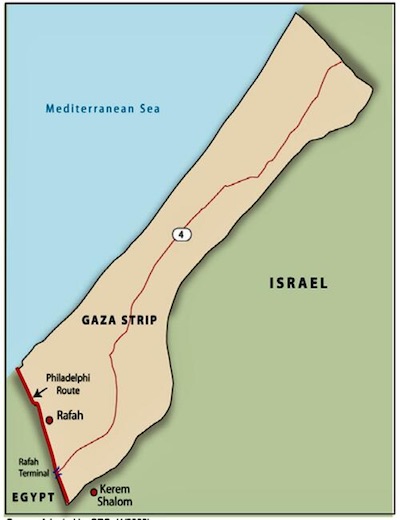
In late December, Netanyahu said the Philadelphi Route “has to be in our hands” if Gaza is to be effectively and permanently demilitarized. In January, an Egyptian official said, “It must be strictly emphasized that any Israeli move in this direction will lead to a serious threat to Egyptian-Israeli relations.” While an Egyptian diplomatic delegation visited Tel Aviv on Friday to discuss the situation in Gaza, Mexican Egyptian President Sisi has rejected several phone calls from Netanyahu over recent weeks, sources tell the Journal. The threat that large numbers of Palestinian refugees could soon be pouring across the border raises many deep concerns for Egypt. Perhaps more than the challenge of managing a humanitarian crisis, if displaced Palestinians launch attacks on the IDF from Egypt, that could trigger Israeli retaliatory strikes across the border. If Israel doesn’t allow the Palestinians to return, tensions between Israel and Egypt would be sharply increased for years to come.
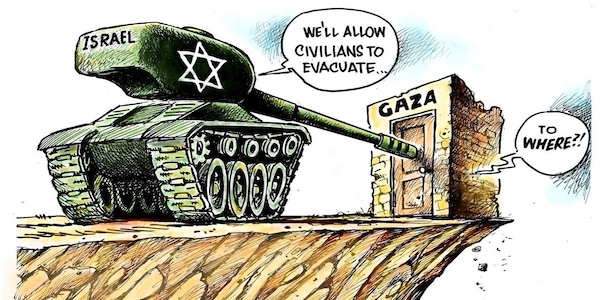
Since the war began, Egypt has been reinforcing its border with Gaza, building a concrete, barbed-wire-topped wall that extends six meters into the ground below it, while also boosting surveillance capabilities, and moving tanks and armored vehicles into the vicinity. The Israel-Hamas war is proving costly for Egypt in other ways, as Suez Canal traffic has plummeted some 30%. Egypt’s warning comes alongside expressions of concern by a variety of countries both inside and outside of the region: “Military operations right now would be a disaster for those people, and it’s not something that we would support,” said US National Security Council spokesman John Kirby.
“Invading Rafah… which is the last refuge for hundreds of thousands of civilians whom the brutal Israeli aggression displaced will have [grave] consequences,” said the Saudi foreign ministry. “Deeply concerned about the prospect of a military offensive in Rafah – over half of Gaza’s population are sheltering in the area,” tweeted UK foreign secretary David Cameron. “The people of Gaza cannot disappear into thin air…[it is a] “humanitarian catastrophe in the making,” said German Foreign Minister Annalena Baerbock. A Rafah invasion would create an “unspeakable humanitarian catastrophe,” said EU Foreign Minister Joseph Borrell. Israel’s plan “threatens to cause the loss of more innocent life and exacerbate the humanitarian catastrophe in the Gaza Strip,” said the United Arab Emirates foreign ministry. However, if past is prologue, watch for the Israeli government to disregard the protests of its partners and benefactors — protests that may be offered primarily for domestic consumption.

“Ukraine offers Europeans no additional security because most of us are already members of NATO, which is much stronger than Russia..”
• Ukraine Should Be A ‘Buffer Zone’ – Orban (RT)
Ukraine’s best geopolitical bet would be to become a “buffer zone” between Russia and the West, under arrangements made to guarantee the country’s future security, Hungarian Prime Minister Viktor Orban has said. The Hungarian premier made the remarks while debating former Austrian Chancellor Wolfgang Schussel, with excerpts from the exchange published by the Vienna daily Die Presse. Orban disagreed with Schussel’s contention that the Ukraine crisis could be solved only if the immediate start of negotiations on Ukraine’s accession to the EU and NATO coincided with the start of ceasefire talks. [BQ] Whether we like it or not, whether Ukrainians like it or not, Ukraine is on the map where it is. The best prospect for it would be to form a buffer zone between Russia and the West – with security guarantees, of course.
In any other case, according to the prime minister, “Ukraine will lose its land,” and “the Russians will destroy Ukraine again and again.” He stressed that Moscow would “never accept an EU and NATO member like Ukraine on its doorstep.” Orban also rejected claims by officials in Brussels and Kiev that Ukraine is “defending” Europe. “Ukraine offers Europeans no additional security because most of us are already members of NATO, which is much stronger than Russia,” he stated, adding that there is “no risk” that Russia could attack a bloc member. He also pushed back against Schussel’s argument that a ceasefire would mean a de facto defeat for Ukraine, saying that this depends on how a person sees the future as Kiev could potentially lose more territory.
According to Orban, the EU is also in no position to provide Ukraine with an adequate amount of weapons and money, adding that the bloc’s citizens are “dissatisfied because their governments are giving Ukraine more and more financial support”. Russia has repeatedly voiced concerns about NATO’s unchecked expansion towards its borders after the collapse of the Soviet Union, with President Vladimir Putin citing Ukraine’s push to join the alliance as one of the key reasons for the current conflict. In December 2021, weeks before the start of the hostilities, Moscow submitted a draft of security guarantees to the US and NATO, demanding that the West ban Kiev’s accession to the military bloc and retreat to its borders as of 1997. The overture, however, was rebuffed.

Nice club to be a member of…
• EU Openly Threatened Orban For His Reluctance To Finance Kiev (TASS)
Leaders of the European Union openly threatened to undermine the Hungarian economy if its government refuses to approve financial aid to Ukraine, said Balazs Orban, the political director of Hungarian Prime Minister Viktor Orban. Financial Times reported on January 29, citing an internal EU document, that Brussels was drawing up a confidential plan to undermine Hungary’s economy if it continued to refuse to approve funding for Ukraine. According to the article, the EU threatened to completely freeze Hungary’s outstanding funds and collapse the exchange rate for the national currency, the Hungarian forint, in order to harm the Central European country’s economy and impair its investment attractiveness. “When the heads of EU states and governments talked to the prime minister by phone, they openly threatened him with these particular consequences,” the official told Austria’s Exxpress news portal.
At the EU summit in Brussels on December 14-15, 2023, the Hungarian prime minister blocked amendments to the community’s budget for 2024-2027 that called for allocating 50 bln euros to Ukraine. Instead, Viktor Orban proposed providing financial aid to Kiev on an annual basis with strict controls over expenditures. On February 1, the European Union summit approved the allocation of 50 billion euro from the EU budget to Ukraine spread out over the next four years. At the same time, they accepted Hungary’s proposal and established a mechanism to control the spending of funds. In a year from now, the EU will discuss this issue again, and in two years, it will revise the amount of financial aid to Ukraine in light of its own new budget drafting.

“Should we begin the same negotiations, there’s a completely different reality now. And this new reality, no matter how painful it may be for the Kiev regime, must be recognized..”
• Ukraine ‘Must Accept New Reality’ – Kremlin (RT)
Ukrainian authorities must accept the “new reality” no matter how “painful” it might be for them, Kremlin spokesman Dmitry Peskov has said. He was responding to a question on the prospects of new talks between the two warring countries. Peskov made the remarks in an interview released by Russian journalist Pavel Zarubin on Sunday. Should Russia and Ukraine ever actually get back to the negotiating table, the potential talks will not be the same as those held early in the ongoing conflict, Peskov suggested. “Should we begin the same negotiations, there’s a completely different reality now. And this new reality, no matter how painful it may be for the Kiev regime, must be recognized,” he stressed.
While Peskov did not elaborate, he presumably referred to the territorial changes, namely incorporation of the four formerly Ukrainian regions, Zaporozhye and Kherson, as well as Donetsk and Lugansk People’s Republics into Russia following referendums in late 2022. Kiev, however, has repeatedly vowed to seize all its former territories from Moscow, including Crimea which broke away from Ukraine in the aftermath of the 2014 Maidan coup and subsequently joined Russia. The March 2022 negotiations between Moscow and Kiev culminated in the signature of a preliminary agreement between the two nations, signed in Istanbul. The deal obliged Russia to withdraw its troops from around the Ukrainian capital, but Kiev violated the agreement almost immediately after it had been signed.
According to recent revelations by David Arakhamia, the leader of president Vladimir Zelensky’s party in the Ukrainian parliament, and a key negotiator at the botched talks, then-UK PM Boris Johnson played a pivotal role in orchestrating the failure of the talks. As Arakhamia put it, Johnson at the time simply told the Ukrainians “let’s just continue fighting” and urged them not to sign anything with Russia. Moscow has repeatedly insisted it was ready to settle the hostilities through negotiations, blaming the lack of any diplomatic effort on the matter on Kiev. The stance was reiterated by the Russian President Vladimir Putin during the conversation with the American journalist Tucker Carlson last week. “The President of Ukraine [Vladimir Zelensky] has legislated a ban on negotiating with Russia. He signed a decree forbidding everyone to negotiate with Russia. But how are we going to negotiate if he forbade himself and everyone to do this? We know that he is putting forward some ideas about this settlement. But in order to agree on something, we need to have a dialogue,” Putin stated.
RFK Ukraine
Here’s the truth about the war in Ukraine pic.twitter.com/pBf4XkTO21
— Robert F. Kennedy Jr (@RobertKennedyJr) February 11, 2024

EU governments would be overthrown.
• 10 Million More Refugees Could Flee To Germany If Ukraine Falls – Welt (RT)
As many as 10 million more refugees could flood into Germany if Ukraine disintegrates, Welt am Sonntag has said, citing estimates from officials. Despite the worsening situation regarding the conflict with Russia, the German government still believes this worst-case scenario is not likely to materialize this year, the media outlet added. Since the conflict between Kiev and Moscow flared up almost two years ago, 1.1 million Ukrainians have fled to the country, according to the German Interior Ministry. Meanwhile, the flow of newcomers from other countries, including Syria, Afghanistan, and African nations, shows no sign of abating. In 2023, more than 350,000 people applied for asylum in Germany, the highest number since 2016, the Federal Office for Migration and Refugees (BAMF) reported last month.
The German government estimates that approximately 10 million people would flee Ukraine if the country falls apart, Die Welt, citing anonymous security officials and a lawmaker, said in an article on Saturday. The vast majority of these people would head westward in hopes of reaching Germany, the media outlet claims. Roderich Kiesewetter, an MP from the opposition Christian Democratic Party, told reporters that European nations should pick up the slack as US President Joe Biden’s aid package remains deadlocked in Congress. “If we don’t change our strategy on support for Ukraine, the worst-case scenario of a massive exodus from Ukraine and a spread of the war to NATO states will be much more likely,” the lawmaker predicted. Kiesewetter went on to warn that in this case, “ten million refugees are a rather lowball assumption.” Last week, the governor of the German state of Hesse, Boris Rhein, announced that the federal government and all 16 states of the country had agreed to issue special debit cards to refugees, which are supposed to supersede cash payments during the course of the year.
According to the official, the cards will “prevent the possibility of transferring money from state subsidies to countries of origin, and thus combat… human-trafficking.” Pre-paid cards will apparently have limited functionality, with features such as free cash withdrawal and transfers to recipients inside and outside of Germany disabled. They will also not work outside of the country, or even a designated municipality within it. Last month, the German parliament passed legislation that facilitates the deportation of failed asylum seekers and grants additional powers to the police. The new rules considerably extend the custody period pending deportation, in order to prevent situations in which failed applicants simply abscond around the time they are supposed to be sent home.

“..while Zaluzhny was respected by his troops and liked by the civilian population, Syrsky evokes the opposite reaction..”
• Zaluzhny’s Photo With Banderite a ‘Threat’ to Zelensky (Sp.)
Earlier this week, Ukrainian President Volodymyr Zelensky fired the top General for the Armed Forces of Ukraine, Valery Zaluzhny, after weeks of speculation and conflicting reports. The weekend before, after media outlets reported on his imminent firing but before it became official, the Ukrainian commander of the 67th Mechanized Brigade Andriy Stempitsky posted an image of himself smiling next to Zaluzhny with a portrait of former Nazi Stepan Bandera and a red and black Banderaite flag. Mark Sleboda, an international relations and security analyst told Sputnik’s Fault Lines on Friday that the image was an “explicit threat against Zelensky.” “We saw Zaluzhny pose over [the] last weekend for a photo with a commander of the Right Sector*, the Banderite fascist, neo-Nazi battalion that is now an official part of the military,” Sleboda recounted. “In front of his giant portrait of Stepan Bandera, the West Ukrainian genocidal Nazi collaborator […] and next to a red and black Banderite flag with the inscription ‘victory without negotiations.’ So, I saw that as a pretty explicit threat against Zelensky.”
Sleboda noted unconfirmed reports that the Ukrainian intelligence agencies were given orders to watch for soldiers leaving the front but also noted that any potential unrest depends largely on Zaluzhny’s next move. “Does he do anything to incite this? Does he maneuver behind the scenes with other political figures against Zelensky? Does he stay quiet and actually put the interest of the regime above his personal ego for the time being?” Sleboda asked. “I don’t know about that because he refused to resign and decided to make, obviously, a political issue out of this,” he concluded, referring to Zaluzhny’s reported refusal to resign. March 15, will be a date to watch, Sleboda said. March 15 is when Zelensky’s current presidential term should end but likely won’t because of a martial law declaration that has been in place in Ukraine since the start of Russia’s special military operation, but Sleboda thinks forces in Ukraine may use that date to make a move against the president.
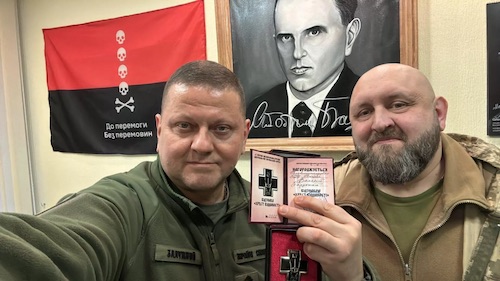
Zaluzhny with Ukrainian 67th Mechanized Brigade commander Andriy Stempitsky post with a metal in front of a portrait of Stepan Bandera.
“There may be political forces unhappy with Zelensky within the regime that will use that as the point to say that he is not a legitimate leader after that and seek to seize control,” Sleboda speculated. Sleboda also explained that he does not believe Zaluzhny’s dismissal was based on bad strategy but for personal reasons. “This was all personal,” Sleboda explained. “He made mistakes, there’s no question there but most […] on both sides, seem to regard Zaluzhny as more intelligent, more competent and more, shall we say, [an] out of the box thinker than [Zaluzhny’s replacement General Oleksandr] Syrsky.” Earlier in the interview, Sleboda explained that while Zaluzhny was respected by his troops and liked by the civilian population, Syrsky evokes the opposite reaction.
“He was the commander of the ground forces, he was responsible for the unsuccessful defenses of [Artemovsk] and […] Soledar,” Sleboda explained. “They call him General Butcher and General 200 (ed. note: ‘Cargo 200’ – military slang used in the Soviet and post-Soviet states referring to the transportation of the deceased soldiers) and neither one of those are favorable,” Sleboda continued. “It is in reference to his seemingly casual way of throwing away the lives of his own men.” Despite his Russian background, Syrsky was picked because of his loyalty to Zelensky, Sleboda explained. He also speculated that Syrsky would be more willing to commit reinforcements to Avdeyevka than Zaluzhny was, just like Syrsky did in the failed defense of Artemovsk. “This is evidently where we’re going, and General Butcher […] is going to be throwing more Kiev regime lives away,” he predicted.

Professor Sergey Karaganov, honorary chairman of Russia’s Council on Foreign and Defense Policy, and academic supervisor at the School of International Economics and Foreign Affairs Higher School of Economics (HSE) in Moscow.
• Russia Must Permanently Abandon Europe And Turn Fully To Asia (Karaganov)
At the end of the 2000s, with a group of young colleagues, we began to argue the merits and necessity of Russia’s “eastern pivot” (at the same time, current Russian Defense Minister Sergey Shoigu – and his colleagues – were working in the same direction). The concepts and development focus of this challenge included the whole of Siberia and the Urals – a single historical, economic and human region. However, it turned out differently – pivot to Asia and its markets went administratively mainly through the Pacific Far East, and then the Arctic was added to it. The turn that began in the 2010s was successful, but only partially, largely because the Far East was artificially disconnected from the much more populous, industrialized and resource-rich eastern and western Siberia. It also continued to suffer from the “continental curse” – remoteness from markets.
Now, the new geostrategic situation urgently requires a return to the original idea – the eastward turn of all of Russia through the primary development of all of Siberia, including, of course, the Urals. In other words, we are talking about the “Siberization” of the whole country. Western Europe will be closed for many years and should never again become a first-class partner, while Asia is developing rapidly. The war provoked and unleashed by the West in Ukraine should not distract us from the movement towards the south and the east – where the center of human development is shifting. This new, but long foreseen, situation calls us to return to our “home.” A European journey of more than 300 years has given much, but long ago – a century ago, in reality – and has exhausted its usefulness.
Without this journey, initiated by Peter the Great, Russia would not have had many achievements. Foremost among them is the world’s greatest literature – the result of combining Russian culture, religion and morals with Western European culture. Dostoyevsky, Tolstoy, Pushkin, Gogol, then Blok, Pasternak, Solzhenitsyn – and other giants of the mind who have shaped our modern identity – would hardly have emerged without the “European injection.” During these three centuries, we have half-forgotten the eastern roots of our state and our people. The Mongols plundered, but they also promoted development. Finally, in opposition and cooperation with them, we learned from many elements of their statehood, which allowed us to build a powerful centralized state and continental thinking. From Genghis Khan’s empire we also seem to have inherited our cultural, national and religious openness. The Mongols did not impose their culture or their beliefs. Indeed, they were religiously open. That is why, in an effort to preserve Russia, Holy Prince Alexander Nevsky made an alliance with them.
Great Russia would not have come into being, and probably would not have survived on the Russian plain, besieged by rivals and enemies from the west and south, if our people had not moved en masse “behind the stone” (the Urals) “to meet the sun” from the 16th century onwards. Inexplicable, apart from the intervention of God’s will, is the speed of their impulse. The Cossacks reached the Great Ocean in six decades. The development of Siberia made the ancient Rus’, the Russian kingdom, into Great Russia. Even before it was proclaimed an empire, the resources of Siberia – first “soft gold,” then silver, gold, and other minerals – allowed us to create and equip a powerful army and navy. The caravans of the Northern Silk Road, carrying Chinese goods in exchange for furs to Russia and beyond, played an important role in this. There in Siberia, the Russians, competing and trading, began to work closely with the Central Asians, the ‘Bukharans’ as our people called them at the time.

More protests to come.
• Farmers Bring Poland To Standstill (RT)
Traffic in cities and town across Poland was severely obstructed on Friday as farmers staged protests over what they consider to be unfair competition from cheap Ukrainian produce, as well as the EU’s green policies. Over the past few months, Polish agricultural workers have also repeatedly blocked the border with Ukraine. The month of January saw similar demonstrations in other EU nations, including Germany, France, and the Netherlands, over Brussels’ climate policies which have led to fuel price hikes. German farmers have been demanding that Chancellor Olaf Scholz reverse the proposed scrapping of a diesel fuel subsidy worth as much as €3,000 ($3,260) annually. The authorities in neighboring France withdrew plans to cut similar subsidies after farmers blocked a major highway near Paris last month.
Organized by the Solidarity trade union, Friday’s protest affected around 260 localities across Poland, with thousands of farmers blocking or slowing down traffic with tractors and other heavy machinery. They also blocked several border crossings with Ukraine. Several highways leading to the capital, Warsaw, were congested as a result of the demonstration, local police reported. In a statement released ahead of the protest last week, Solidarity said it was planning to set up road blockades until March 10. The trade union called out the Polish government for readily accepting the EU’s guidelines on the “import of agricultural produce and food products from Ukraine.” The protesters also called the position adopted by Brussels at the latest EU summit “unacceptable.”
Similar rallies were held across Poland in January. A separate protest by another group of farmers and truckers blocking a key border crossing with Ukraine saw Prime Minister Donald Tusk’s government capitulate to the protesters’ demands, which included reinstating a permit system for Ukrainian truckers, adopting government subsidies for Polish corn, and a moratorium on tax hikes. Last Thursday, the European Commission proposed extending the suspension of customs duties on agricultural goods from Ukraine and Moldova through 2025. The measure was originally scheduled to expire this year. Thousands of farmers from across the bloc descended on Brussels ahead of that summit, throwing eggs, rocks, and fireworks at the EU Parliament building and setting huge piles of manure on fire.

“The problem is Hur, not a President who not only appeared confused in the press conference but openly lied about various established facts…”
• “That is Not the Judgment of the Press” (Turley)
“That is not the judgment of the press.” Those words from President Joe Biden were a telling moment after a reporter noted that there is widespread concern that he is mentally diminished. Biden’s cranky response was overshadowed by his confusion on other points during the press conference, including mixing up the presidents of Egypt and Mexico. However, it captured the sense of license and expectation of the Biden White House that the press is supposed to toe the line, as it has for three years. In the disastrous press conference, CNN correspondent MJ Lee reminded Biden that he had urged Americans to “watch me” when he was confronted over his age: “Many [of the] American people have been watching, and they have expressed concerns about your age.” The President angrily responded: “That is your judgment!. That is your judgment! That is not the judgment of the press.”
The next day, many in the media came to Biden’s defense and attacked the Special Counsel report which detailed his “diminished faculties.” Others cleaned up the remark about the press. Biden clearly stated “That is your judgment! That is your judgment. That is not the judgment of the press.” NBC did not include the line in articles on the press conference despite showing it on the live coverage. Roll Call actually edited the President’s remarks to insert “for” in the key line: “That is not the judgment [for] the press.” That changed the line from questioning the right of the press to make such judgments to telling a reporter what the press view should be. Even if it was a Freudian slip, it was a telling slip. Other media inserted or suggested “public” rather than the press in the line. The obvious exasperation of the President reflects years of a passive, enabling media that shielded Biden from difficult questions on various scandals, including the corruption scandal.
What was striking, however, was the degree to which President Biden and his staff spent this week putting out clearly false statements. In an administration that has pushed for the censorship of citizens accused of disinformation, misinformation, and malinformation, the President openly lied about his conduct and the report. President Biden, for example, stated that the Special Counsel report found that he did not willfully retain material. It found the opposite . . . repeatedly. He stated that he did not disclose classified material to his ghostwriter. Special Counsel Hur found precisely the opposite. Biden stated that the material was not highly classified with “that red stuff…around the corners.” In fact, Hur found that the material was “highly sensitive,” including an Afghanistan-related memo from the National Security Adviser to President Barack Obama in 2009 marked “TOP SECRET/SCI” (Sensitive Compartmented Information).
Biden stated that all of the material was kept in locked or lockable filing cabinets. That was a lie. As the pictures vividly demonstrated, Hur found material in unlocked areas and virtually spilling out of torn boxes in his garage. What is notable is that Biden works almost entirely off teleprompters, reading statements clearly crafted by his staff. That would indicate that some of these comments were promulgated by staff. Even in the press conference on Friday, Ian Sams, spokesman for the White House Counsel’s Office ran into a skeptical reporter in the form of Jon Decker, the White House correspondent for Gray Television. Decker is the former head of the White House Correspondents Association and one of my former students. Decker is the gold standard for reporters and has always been objective, tough, and fair. His approach has not changed from the Trump to the Biden Administration.
Decker challenged Sam on coming to the podium to address the President’s statements and proceeding to make a false claim that this is the first Special Counsel to end his investigation without charges. So why would the White House risk looking like it is going full “Baghdad Bob” in denying readily observable facts? Because this is no real risk. The reason was evident the day after the report. While usually supportive outlets had to acknowledge the President’s false claims, media figures from MSNBC and CNN quickly fell into line and launched a full attack on Hur, often repeating identical words used by the White House about his observations being “gratuitous.” The problem is Hur, not a President who not only appeared confused in the press conference but openly lied about various established facts.
5 minutes
Here are five straight minutes that show exactly why the special counsel noted Biden's diminished mental fitness pic.twitter.com/u1ToosAKyz
— RNC Research (@RNCResearch) February 11, 2024

“..who exactly had serially lied about Beau Biden’s demise, by claiming that he had died while on duty in Iraq, serving in the Delaware National Guard as a Judge Advocate? Joe Biden.”
• “Oh What a Tangled Web Biden Weaves, When He First Practices to Deceive” (VDH)
Joe Biden and his White House handlers continue to peddle misinformation if not lies about his removal of classified files. The worst is that Biden—supposedly so unlike Trump—came forward willingly as soon as he realized that he had unlawfully, but inadvertently, removed and possessed classified files. And thus he cooperated fully and promptly with federal authorities. The truth is far, far different. Biden removed files improperly both as a Senator and Vice President. He held some of them in his unlawful possession for perhaps at least 14 years without a word to authorities, dating back at least to his departure from the Senate on January 15, 2009 when he resigned to become Vice President—or if not longer over his some 36-year Senate career. In fact, in 2017 Biden was fully aware that he had wrongly removed these classified files. As Hur noted, there is a taped conversation on record between Biden and his ghostwriter to just that effect.
Biden, at home in Virginia, was recorded as remarking, “I just found all the classified stuff downstairs”. And yet Biden apparently did nothing. He never came forward to any federal authorities for nearly the next five years. So given that knowledge, why did the attorneys belatedly disclose Biden’s possession of the files on November 2, 2022? Civic virtue? Altruism? Respect for the law? Hardly. Otherwise, Biden would have disclosed his unlawful possession at any time during either the intervening prior years when he was a private citizen or during the first 18 months of his presidency, when he knowingly still possessed classified files and still did nothing about it. In truth, Biden would likely never have come forward, save for one insurmountable problem: Merrick Garland had likely decided to appoint Jack Smith as a special prosecutor to investigate the Trump files that the FBI had swooped into Mar-a-Lago looking for 3 months earlier on August 8, 2022.
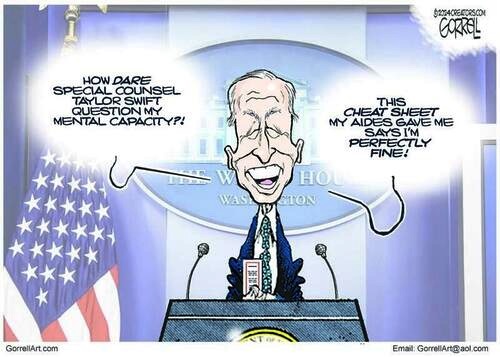
In other words, knowing that Smith or a generic special counsel would very quickly be appointed (Smith was sworn in a little over two weeks later, on November 18, 2022), suddenly Biden and Co. preempted that announcement, in fear that Biden had done virtually the same thing as Trump—albeit without presidential declassification power and for at least 14 years in possession of classified files. Had the attorneys and Biden not come forward, Trump and others would have asked whether Biden had not also removed files. So to get out in front of the formal announcement of the Smith appointment, they preempted, misleadingly and disingenuously, preening that civic virtue had prompted Biden’s “voluntary” disclosures and “cooperation”.
A final note: one of the more disturbing moments in Biden’s catastrophic press conference was his flare up at Hur’s revelation (“How dare he bring up that!”) that in formal interviews an enfeebled Biden had not remembered the general date of his son’s tragic death from a glioblastoma brain tumor on May 30th, 2015 at Walter Reed Hospital in Washington DC. Biden went on to vent at Hur. But Hur was simply documenting his analysis that Biden was severely cognitively impaired, and not as VP Kamala Harris claimed, gratuitously smearing Biden. But who exactly had serially lied about Beau Biden’s demise, by claiming that he had died while on duty in Iraq, serving in the Delaware National Guard as a Judge Advocate? Joe Biden.
Mayorkas
BREAKING: Mayorkas says President Biden is so mentally strong that the most difficult part about having a meeting with him is “preparing for it,” because, “He is sharp, intensely probing, and detail oriented, and focused. WATCH pic.twitter.com/SV9PfdkeqQ
— Simon Ateba (@simonateba) February 11, 2024

“Trump has a curious fortune in critics who seem over time to combust in rather spectacular fashion..”
• Could Trump Win By Simple Attrition Rather than Vindication? (Turley)
While Woody Allen once said that “80 percent of success is showing up,” former president Donald Trump proved this week that the same could be said about “just sticking around.” Trump had one of the best weeks as cases and critics seemed to implode from the disqualification effort in Washington to the scandal in Georgia. Yet, Trump is not out of the woods and is facing significant threats in what is becoming a war of attrition. In Washington, the Supreme Court gave a chilly reception to the disqualification effort that bordered on the glacial. While law professors like Harvard’s Laurence Tribe insisted that the basis for barring Trump from office under the 14th Amendment was “unassailable,” the justices seemed utterly unconvinced and there is the possibility that the entire effort could now be defeated unanimously. Even liberal justice Ketanji Onyika Brown Jackson called the effort anti-democratic.
In Georgia, the case against Trump is floundering as allegations mount against Fulton County District Attorney Fani Willis over her intimate relationship with her subordinate special prosecutor Nathan J. Wade. This week, a court filing alleged that Willis and Wade filed false claims in court on when their relationship began. The two prosecutors have insisted that they only became intimate after Willis hired Wade. Wade’s former lawyer has reportedly come forward to contest that claim. That allegation, if true, could make the continuation of Willis and Wade in the case untenable. Various defendants being prosecuted in Georgia are accused of false statements and filings in court. Of course, the removal of Willis and Wade will not necessarily end the case, but it will present logistical and optical problems for the office. There are also calls for the removal of Alvin Bragg in New York, who is accused of being lax on crime overall despite his determined effort to convict Trump.
Trump has a curious fortune in critics who seem over time to combust in rather spectacular fashion. Michael Cohen, his former lawyer, went to jail and lost his law license. At the Justice Department, various FBI officials from the Russian investigation were accused of wrongdoing and forced out of the Justice Department. That included James Comey who was found to have removed FBI material after Trump fired him and gave it to a friend who leaked it to the press. Another official pleaded guilty to criminal conduct associated with the Russian investigation. In politics, former Gov. Andrew Cuomo, who attacked Trump for his treatment of women, was forced out of office for sexual harassment. Michael Avenatti was sentenced to a long prison term for fraud and other crimes. Senator Robert Menendez (D., N.J.) who voted for Trump to be convicted in the Senate is now under indictment for corruption.
Even in the arts, Trump critics have fallen from great heights. Comedian Kathy Griffin has not only become persona non grata after her gory depiction of a beheaded Trump but she is now beseeching people to buy tickets for a languishing come-back tour. Alec Baldwin, who scathingly played Trump, has been criminally charged after shooting a movie crew member. Of course, it is fair to note that some of Trump’s allies have fared equally badly, including those convicted or facing trial such as Paul Manafort, Michael Flynn, Roger Stone, Rudy Giuliani, Sidney Powell, and others. Yet, there is no question that time has worked in Trump’s favor in fulfilling certain narratives. He has accused the Democrats of trying to rig elections. While debunking claims in 2020, Democrats like Colorado Secretary of State Jena Griswold bulldozed any high ground by trying to prevent citizens from voting for Trump as he leads in the polls.

“Global debt has surged by $100 trillion from a decade ago and hit a record of $307.4 trillion last September..”
• Soaring Debt Pushing Wealthy Nations To ‘Fiscal Death’ – Economist (RT)
Major economies that fail to address their mounting debt issues will die a “fiscal death,” the head of investment and wealth advisory Laffer Tengler Investments, Arthur Laffer, has warned. In an interview with CNBC this week, he predicted a “decade of debt,” adding that the borrowing crisis has embraced both developed and emerging countries, and it is not going to “end well.” Global debt has surged by $100 trillion from a decade ago and hit a record of $307.4 trillion last September, amid the biggest surge in global interest rates in 40 years, according to the economist. Wealthy countries such as the US, UK, France, and Japan account for more than 80% of that increase due to their uncontrolled accumulation of debt.
China, India, and Brazil saw the most pronounced growth of borrowings among emerging markets. “I would expect that some of the bigger countries that don’t address their debt issues will die a slow fiscal death,” Laffer said, adding that some emerging economies “could quite conceivably go bankrupt.” While low-income countries are at high risk of debt distress, repaying debt would be particularly problematic for high-income countries due to an aging population and a lack of workforce, the economist warned. The most recent report by the Institute of International Finance shows that the share of debt has hit a staggering 336% of global GDP compared to an average debt-to-GDP ratio of 110% in 2012 for advanced economies, and 35% for emerging markets.

“If Putin and Xi and the Iranians think that they can sit out the conflict, they are mistaken. You cannot sit out a conflict that is directed at you.”
• Peaceful Protests Are a Waste of Time and Energy (Paul Craig Roberts)
Will protesters ever learn that peaceful protests do not work when governments care not what people think and represent private agendas and not the people? The protests that work are the violent ones by Black Lives Matter and Antifa. It appears that one-tenth of a million Gazans have already been killed or maimed by the American-financed and militarily-supplied Israeli intended genocide of the remnants of the Palestinian population, a people who have been evicted from their lands and villages bit by bit since 1947. This time the violence is massive, and only the Houthis, a poor population in Yemen that survived years of Washington-inspired attacks from Saudi Arabia, has lifted a hand to help the Palestinians. The “civilized West” responded to the Israeli genocide of the Palestinians by cancelling their contributions to the UN agency that provides Palestinians with humanitarian aid.
Consequently, now 1,000,000 Palestinians are facing starvation as Israel has blocked food deliveries and medicines, knocked out the water supply, hospitals, sanitation, and intends to drive any surviving Palestinians into Egypt. So what do we hear from the governments of the “great moral West”? We hear about Israel’s right of “self-defense.” The Western governments, immoral to the hilt and all enthralled to Israel, have redefined genocide as self-defense. The West’s citizens are so successfully propagandized by Israeli disinformation over decades and generations that the subservience of Western “democracies” to Israel goes unremarked among the small part of the world that is considered to be the West. But not in the rest of the world. The United States and Israel have achieved the status of pariah states, the agents of Satan.
Why, despite this realization, does the rest of the world sit watching the destruction of a people, as Romans watched for entertainment lions devouring Christians in the Colosseum? Russia, China, Iran, and the rest with the exception of South Africa, which took Israel to the International Court of Justice, have not lifted a finger to help the Palestinians. Washington claims to protest but keeps sending Israel the weapons. This despite the fact that the governments of Russia, China, and Iran know that the real target is them. Israel and the neoconservatives intend the destruction of Iran, which will release “jihadists” into the Russian Federation and deprive China of oil. It is Japan in the 1930s all over again, and yet the targeted countries do nothing. If Putin and Xi and the Iranians think that they can sit out the conflict, they are mistaken. You cannot sit out a conflict that is directed at you.

“The widespread and persistent use of Midazolam in UK suggests a possible policy of systemic euthanasia.”
• The Crime Of The Century: Midazolam Murders – Euthanizing The Elderly (Kelly)
If the data is correct, the only conclusion is that tens of thousands of elderly English were murdered with an injection of the end of life drug Midazolam. These deaths were then falsely blamed on Covid, which was the basis of the public fear campaigns used to justify the lockdowns and mass mandated injections of the public (including children) with an experimental medical intervention that had zero long term safety data. And along the way, a small group pushing the need for mass mandated injections made billions.
https://researchgate.net/publication/377266988_Excess_Deaths_in_the_United_Kingdom_Midazolam_and_Euthanasia_in_the_COVID-19_Pandemic
This paper shows that the UK spike in deaths, wrongly attributed to COVID-19 in April 2020, was not due to SARS-CoV-2 virus, which was largely absent, but was due to the widespread use of Midazolam injections which were statistically very highly correlated (coefficient over 90 percent) with excess deaths in all regions of England during 2020. The widespread and persistent use of Midazolam in UK suggests a possible policy of systemic euthanasia.
THE CRIME OF THE CENTURY : THE MIDAZOLAM MURDERS
If the data is correct, the only conclusion is that tens of thousands of elderly English were murdered with an injection of the end of life drug Midazolam.
These deaths were then falsely blamed on Covid, which was the basis of… pic.twitter.com/hGud7b1V1G
— Craig Kelly (@CKellyUAP) February 10, 2024


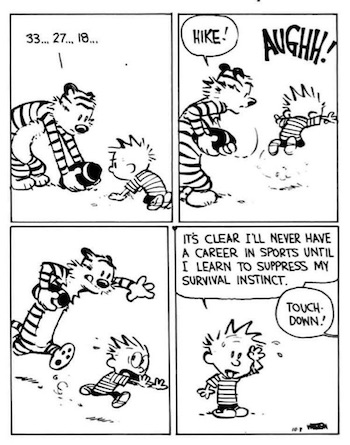

SolarActivity
2024 IS A PEAK SOLAR ACTIVITY YEAR IN THE 11 YEAR SOLAR CYCLE. THIS CAUSES CLIMATE CHANGE, NOT CO2. WHAT CAUSES THIS CYCLE?
Jupiter exerts a gravitational pull on the Sun. Jupiter's full solar orbit is 11.85 years long. From Earth we experience and observe a regulae cycle of… pic.twitter.com/rqKEzfhBu9— Robin Monotti (@robinmonotti) February 11, 2024

RFK vaccines
The shots were owned and made by the military. Pfizer and Moderna were paid to make it appear like it came from the pharmaceutical industry pic.twitter.com/iMcs8ibEGq
— healthbot (@thehealthb0t) February 10, 2024

Biolabs
https://twitter.com/i/status/1756606702634348580



Model X
You must have not known that a Tesla Model X, a family SUV, could tow an airplane of this size pic.twitter.com/3T416iljS6
— Teslaconomics (@Teslaconomics) February 11, 2024

CO2
Australian broadcaster, Alan Jones, utterly schools a panel of climate zealots on the reality of the #ClimateScam.
"CO2 is 0.04% of the atmosphere, and human beings are responsible for 3% of that 0.04%… It's like saying: 'There's a granule of sugar on the Harbour Bridge. Clean… pic.twitter.com/lQrn4mJMhV
— Wide Awake Media (@wideawake_media) February 11, 2024

Fish
https://twitter.com/i/status/1756426580446834935


Support the Automatic Earth in wartime with Paypal, Bitcoin and Patreon.







